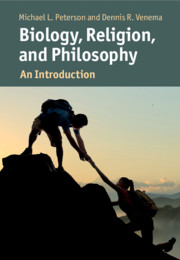Book contents
- Biology, Religion, and Philosophy
- Cambridge Introductions to Philosophy and Biology
- Biology, Religion, and Philosophy
- Copyright page
- Dedication
- Contents
- Acknowledgments
- Introduction
- Part I General Issues
- Part II Religion and Human Biology
- 6 Human Nature and Human Uniqueness
- 7 Love and Altruism in Biology and Religion
- 8 Biology, Ethics, and Debunking Arguments
- 9 Biological Accounts of Religion
- 10 Humanity, Religion, and the Environment
- Glossary
- Further Reading
- Index
6 - Human Nature and Human Uniqueness
from Part II - Religion and Human Biology
Published online by Cambridge University Press: 25 March 2021
- Biology, Religion, and Philosophy
- Cambridge Introductions to Philosophy and Biology
- Biology, Religion, and Philosophy
- Copyright page
- Dedication
- Contents
- Acknowledgments
- Introduction
- Part I General Issues
- Part II Religion and Human Biology
- 6 Human Nature and Human Uniqueness
- 7 Love and Altruism in Biology and Religion
- 8 Biology, Ethics, and Debunking Arguments
- 9 Biological Accounts of Religion
- 10 Humanity, Religion, and the Environment
- Glossary
- Further Reading
- Index
Summary
Homo sapiens is the only species that asks questions about its own existence, which means that we are self-interpreting animals. We humans have always been on a quest to know our own nature and to ask whether being human makes us significantly unique, qualitatively different from all other things, living and nonliving. Traditional philosophical traditions maintain that humans are special, and indeed, the highpoint of the natural world, while major religious traditions generally affirm human specialness based on our relation to the divine. In early modernity, however, the Galileo affair was seen as consolidating the “Copernican humiliation” of humanity; it initiated a great change in the way science understands the status of human beings, a change that has profoundly impacted philosophical and religious understandings.
- Type
- Chapter
- Information
- Biology, Religion, and PhilosophyAn Introduction, pp. 133 - 156Publisher: Cambridge University PressPrint publication year: 2021

